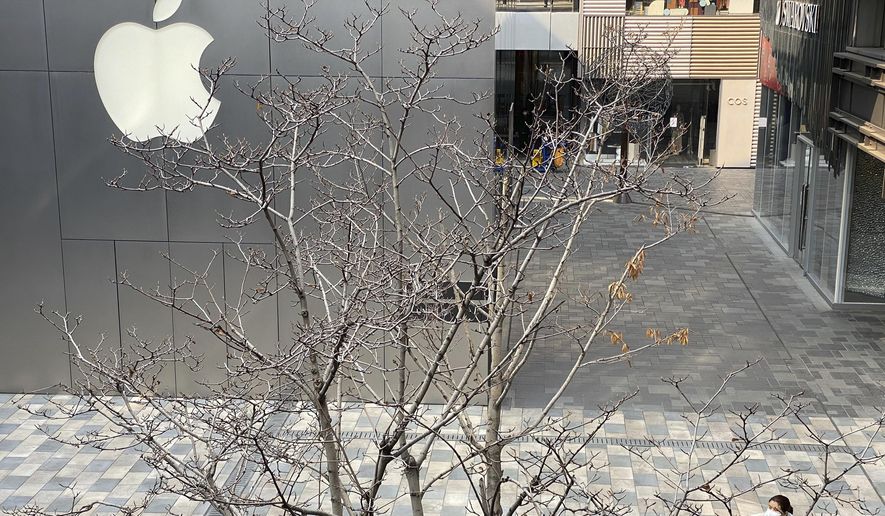August 23, 2021
-Washington Times
Apple proactively implements censorship to stay in China‘s good graces, according to Citizen Lab, a research group at the University of Toronto.
The group discovered the American company restricts speech that counters Chinese Communist Party ideology in its product “engravings” offered overseas, and does so in some cases where foreign law does not require censorship.
Citizen Lab‘s study reveals Apple‘s willingness to eschew the American value of free expression when dealing with authoritarian regimes controlling access to large markets.
Apple allows its customers to engrave products such as iPads and AirPods with words and emojis but the study found that the company filters out certain messages in China, Hong Kong and Taiwan.
For example, Apple clamped down on the Chinese phrases for “freedom of the press,” “Wuhan pneumonia,” and the names of media outlets that are critical of the Chinese Communist Party like “Voice of America,” according to Citizen Lab.
“Within mainland China, we found that Apple censors political content including broad references to Chinese leadership, China‘s political system, names of dissidents, independent news organizations, and general terms relating to democracy and human rights,” read the report from Citizen Lab‘s Jeffrey Knockel and Lotus Ruan.
But it wasn’t only the People’s Republic.
“Moreover, we found that much of this political censorship bleeds into both Hong Kong and Taiwan. Some of the censorship exceeds Apple‘s legal obligations in Hong Kong, and we are aware of no legal justification for the political censorship of content in Taiwan,” Mr. Knockel and Ms. Ruan wrote.
Apple did not respond to request for comment, but Citizen Lab said it found evidence Apple may not understand what content it filters in Chinese-language regions.
The tech giant looks to have censored Chinese keywords based on how others did so, per Citizen Lab.
Jane Horvath, Apple chief privacy officer, told Citizen Lab that the company tries to deny requests that are vulgar and culturally insensitive, could incite violence, or would be considered illegal, among other things.
In a letter published by Citizen Lab, Ms. Horvath said Apple relies in large measure on manual curation of engraving requests and not an automated process.
“We handle engraving requests regionally. There is no single global list that contains one set of words or phrases,” Ms. Horvath wrote. “Instead, these decisions are made through a review process where our teams assess local laws as well as their assessment of cultural sensitivities. We revisit these decisions from time to time. While those teams rely on information from a range of sources, no third parties or government agencies have been involved the process.”
To discover the extent of Apple‘s alleged censorship, Citizen Lab reviewed 505,902 keywords censored across a wide variety of Chinese applications, and discovered 1,105 “keyword filtering rules” that Apple uses to screen the content of product engravings across China, Hong Kong, Taiwan, Japan, Canada and the U.S.
Citizen Lab said Apple sometimes restricts phrases in the U.S. in accordance with rules governing vanity driver’s license plates but still allows offensive phrases like “Nazi” and “Slanteye,” that it restricts in Canada.
Nearly a fifth of Apple‘s total revenue comes from mainland China, according to Citizen Lab‘s estimate, and Apple‘s subservience to the communist regime’s interests do not appear limited to their product engravings.
Apple censored the Taiwan flag emoji for those using its operating system while having their device’s region set to Hong Kong, Macau, or mainland China, according to Citizen Lab.
In 2019, Apple Music removed a song by a Hong Kong singer from its streaming service that referenced China‘s violent 1989 crackdown in Tiananmen Square, according to the Hong Kong Free Press, an English-language newspaper.
Apple is not alone among tech companies changing their practices to conduct business in China.
Citizen Lab previously analyzed Microsoft’s Skype telecommunications app and Citizen Lab‘s researchers said they found keyword-filtering features aimed at mainland Chinese users.
“What is most alarming based on our current findings is the lack of transparency in Apple‘s content moderation policies and the unexplained extension of politically motivated moderation rules from one region to another,” wrote Citizen Lab on its website. “However, while all companies face pressure from governments, they have other choices than to blindly comply with that government’s requirements.”




